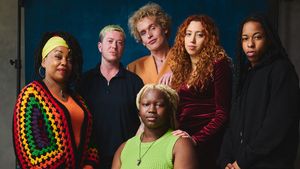Treatment GuideJust DiagnosedSex & DatingAfrican AmericanStigmaAsk the HIV DocPrEP En EspañolNewsVoicesPrint IssueVideoOut 100
CONTACTCAREER OPPORTUNITIESADVERTISE WITH USPRIVACY POLICYPRIVACY PREFERENCESTERMS OF USELEGAL NOTICE
© 2025 Pride Publishing Inc.
All Rights reserved
All Rights reserved
Scroll To Top
By continuing to use our site, you agree to our Privacy Policy and Terms of Use.
New discoveries about the immune defenses of rare HIV patients who produce antibodies that prevent infection suggest a novel direction for designing new vaccines.
Researchers at Rockefeller University and colleagues have now made two fundamental discoveries about the so-called broadly neutralizing anti-HIV antibodies, which effectively keep the virus at bay. By detailing the molecular workings of a proven immune response, the researchers hope their work will ultimately enable them to similarly arm those who are not equipped with this exceptional immunological firepower. The findings are reported in the September 30 issue of the journal Nature.
"Nobody yet can make a vaccine that elicits these broadly neutralizing antibodies, but here are patients who can do it, so let's understand how," says Michel C. Nussenzweig, Sherman Fairchild Professor and head of the Laboratory of Molecular Immunology. "That's the theme in this work. The reason the research community is not making this vaccine is not that we're not good engineers. We are. The reason is that we don't understand how these patients produce these antibodies, and that's what we're figuring out. If we know how they're doing it, we might learn how to reproduce it."
HIV strains mutate rapidly, making them notoriously evasive targets for the immune system. In particular, the HIV envelope spike, called gp160, is the site of a host of mutations that obstruct the few elements that all of the virus strains share. Prior research has shown that only four superantibodies block the activity of that protein in a broad range of HIV strains, neutralizing the virus. But all attempts to coax the human body into producing those four have failed.
Last year, in experiments reported in Nature, the Nussenzweig lab showed that a diverse group of broadly neutralizing antibodies cloned from 433 B cells of six slow progressing HIV patients were as capable of knocking down a broad range of HIV strains as any one of the superantibodies. The ability to isolate and clone antibodies from B cells was first worked out by the lab in a pioneering 2003 paper in Science. Now, having applied that method to the B cells in HIV patients with high titers of broadly neutralizing antibodies, the new research explores in more detail what their antibodies target and how they attack.
In work to be published September 30 in Nature, postdoc Hugo Mouquet, Nussenzweig, and colleagues found a surprising result. Most antibodies are traditionally thought to bind to their target, or antigen, in a bivalent fashion, meaning they get a firm grip by taking hold of two specific handles. But HIV virions do not allow for that possibility because the gp160 spikes are too far apart. Therefore, antibodies to the virus are handicapped because they can only use one of their two high affinity arms to recognize the viral spike.
The researchers found that on average 75% of the anti-gp160-HIV antibodies in their large collection were selected by the immune system for polyreactivity, a property that allowed the second "free" arm of the antibody to enhance overall affinity by binding to the virion "nonspecifically." Generally, the immune system weeds out polyreactive antibodies, even though they are naturally produced in significant quantities, because polyreactive antibodies could in theory attack the body itself.
But the experiments suggest that these "sticky" antibodies may be an opportunistic adaptation to difficult cases such as HIV, in which homotypic bivalent bonding may not be an option. This particular cadre of polyreactive antibodies takes a long time -- years -- to develop in slow progressing HIV patients, and much remains to be discovered about that process, but the researchers believe that vaccine designed to elicit antibodies that mimic these properties could be a promising strategy to beat the deadly virus.
In related research published in August in The Journal of Experimental Medicine, visiting student John Pietzsch, Nussenzweig, and colleagues mapped the target of the largest single group of neutralizing antibodies found in HIV-infected patients with broadly neutralizing serologic activity. These antibodies including one of the recently described super antibodies, targeted a previously undefined region of the HIV envelope protein, a region that is nearby but distinct from the site targeted by previously described super antibodies. By mutating individual amino acids of this target and discovering that the result was an impotent virus, they showed that the largest group of broadly neutralizing antibodies targets a region on the HIV envelope spike that is indispensable for infection.
"The largest group of the HIV neutralizing antibodies was unmapped -- this group might have been specific for a number of different sites on the virion," Nussenzweig says. "But they are directed to a single core epitope on the viral spike, near the CD4 binding site. Our findings extend the footprint of what a neutralizing antibody can see."
This site, a core element of the HIV envelope spike that is shared by a full range of HIV strains, is an attractive new target that should be considered for vaccine design, the scientists say, and they are working on how to attack it. Nussenzweig, whose lab has only in the last couple of years begun working on HIV antibodies, says, "We're making basic discoveries about how antibodies work by studying a disease in patients. We could not do this work in a model organism."
From our Sponsors
Most Popular
Lexi Love comes out as HIV+ after Trump deletes federal resources
January 23 2025 11:23 AM
Grindr is reminding us why jockstraps are so sexy and iconic
May 02 2025 5:36 PM
BREAKING NEWS: Trump admin moves to end federal HIV prevention programs
March 18 2025 6:10 PM
Trump's orders prompt CDC to erase HIV resources
January 31 2025 5:29 PM
Celebrating Black History Month with our annual African American issue
February 01 2025 3:28 PM
Tyler TerMeer vows to continue to fight for health care for all
January 28 2025 3:00 PM
Discover the power of Wellness in your life
March 26 2025 12:41 PM
Plus: Featured Video
Latest Stories
Dancer. Healer. Survivor. DéShaun Armbrister is all of the above
July 02 2025 8:23 PM
Two right-wing Supreme Court justices signal they may uphold access to PrEP and more
April 21 2025 4:10 PM
Broadway's best raise over $1 million for LGBTQ+ and HIV causes
April 03 2025 7:15 PM
Plus nominated for 2025 GLAAD Media Award
January 22 2025 12:42 PM
'RuPaul's Drag Race' star Trinity K Bonet quietly comes out trans
December 15 2024 6:27 PM
AIDS Memorial Quilt displayed at White House for the first time
December 02 2024 1:21 PM
BREAKING: Supreme Court rules to save free access to preventive care, including PrEP
June 27 2025 10:32 AM
1985: the year the AIDS crisis finally broke through the silence
June 26 2025 11:24 AM
Trump admin guts $258 million in funding for HIV vaccine research
June 03 2025 3:47 PM
500,000 Children at Risk: PEPFAR Funding Crisis
April 08 2025 3:51 PM
The Talk Season 5 premieres this spring with HIV guidance for the newly diagnosed
March 26 2025 1:00 PM
Jess King is here to help you live your happiest, healthiest life yet
March 24 2025 4:35 PM
A camp for HIV-positive kids is for sale. Here's why its founder is celebrating
January 02 2025 12:21 PM
VIDEO: A man living with HIV discusses his journey to fatherhood
June 10 2025 4:58 PM
HRC holds 'die-in' to protest Trump health care cuts
April 28 2025 2:11 PM
Season 4 of The Switch on resilience & radical self-love returns this spring
March 26 2025 12:20 PM
Gerald Garth is keeping people of color happy and healthy through trying times
March 11 2025 3:38 PM
This long-term HIV survivor says testosterone therapy helped save his life.
December 16 2024 8:00 PM
Ricky Martin delivers showstopping performance for 2024 World AIDS Day
December 05 2024 12:08 PM












































































